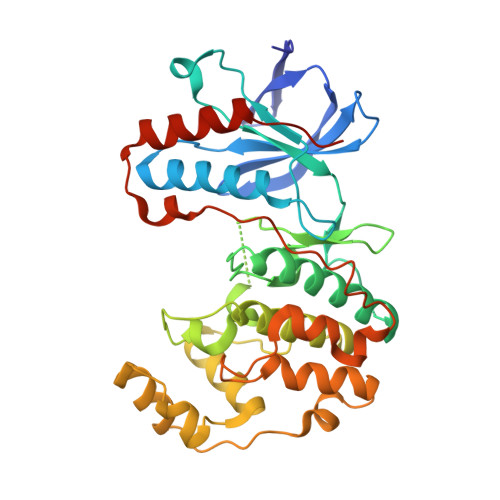Inhibition of p38 MAP kinase by utilizing a novel allosteric binding site.
Pargellis, C., Tong, L., Churchill, L., Cirillo, P.F., Gilmore, T., Graham, A.G., Grob, P.M., Hickey, E.R., Moss, N., Pav, S., Regan, J.(2002) Nat Struct Biol 9: 268-272
- PubMed: 11896401
- DOI: https://doi.org/10.1038/nsb770
- Primary Citation of Related Structures:
1KV1, 1KV2 - PubMed Abstract:
The p38 MAP kinase plays a crucial role in regulating the production of proinflammatory cytokines, such as tumor necrosis factor and interleukin-1. Blocking this kinase may offer an effective therapy for treating many inflammatory diseases. Here we report a new allosteric binding site for a diaryl urea class of highly potent and selective inhibitors against human p38 MAP kinase. The formation of this binding site requires a large conformational change not observed previously for any of the protein Ser/Thr kinases. This change is in the highly conserved Asp-Phe-Gly motif within the active site of the kinase. Solution studies demonstrate that this class of compounds has slow binding kinetics, consistent with the requirement for conformational change. Improving interactions in this allosteric pocket, as well as establishing binding interactions in the ATP pocket, enhanced the affinity of the inhibitors by 12,000-fold. One of the most potent compounds in this series, BIRB 796, has picomolar affinity for the kinase and low nanomolar inhibitory activity in cell culture.
Organizational Affiliation:
Department of Biology, Boehringer Ingelheim Pharmaceuticals, Research and Development Center, 900 Ridgebury Road, Ridgefield, Connecticut 06877, USA. [email protected]















